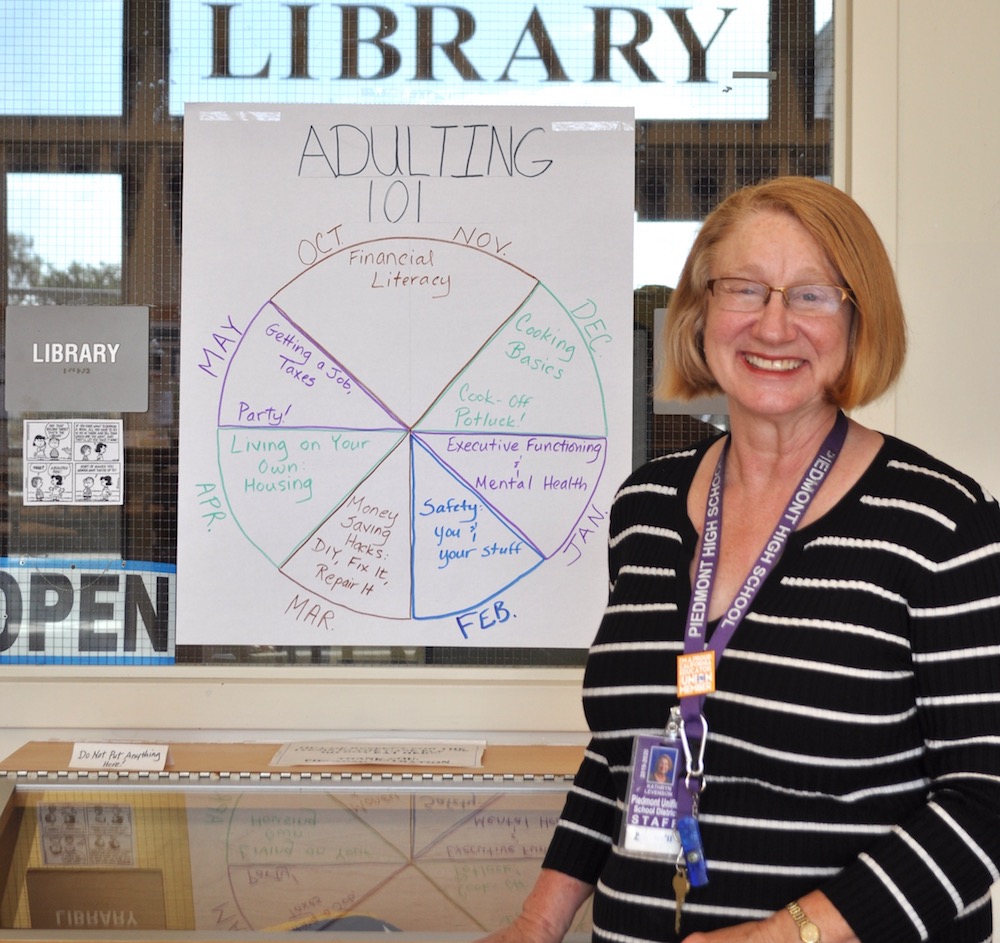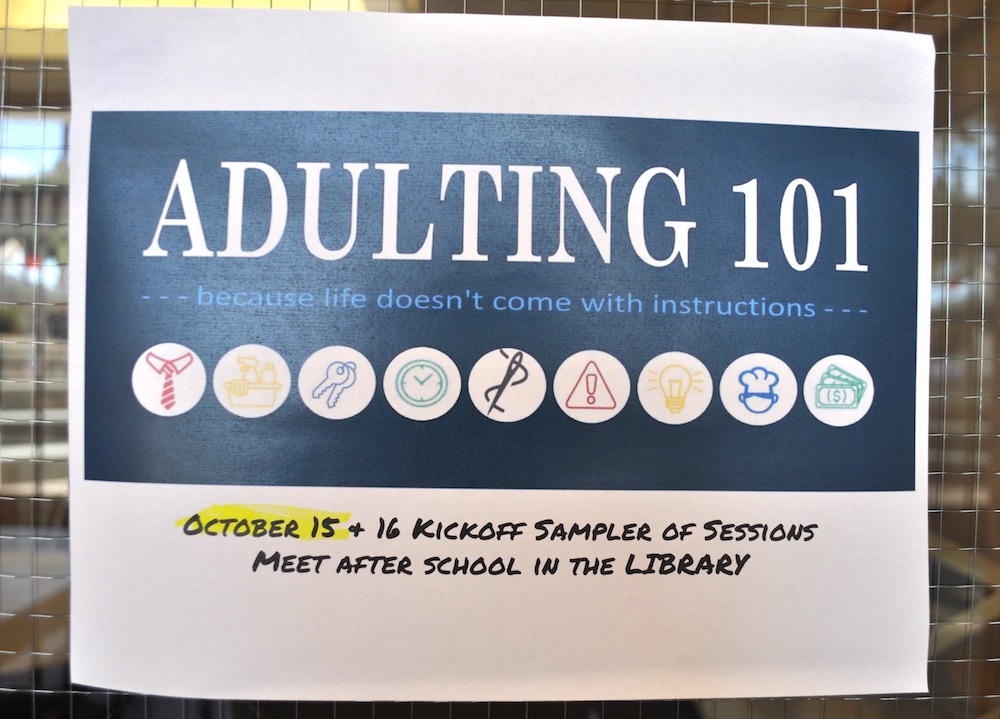What do you call the action of living life as an adult? Piedmont high school students are signing up for an after-school class to find out.
In the past few years, the term “adulting” has been used in casual conversations IRL (“in real life”) and also on social media. The world “adulting” can be traced back to a tweet in October 2008. The word exploded in 2015, when Twitter found the term increased by 700% and in 2016, when the word appeared online more than 80,000 times a month. Although it has yet to make its way into Merriam-Webster, the word essentially means acting grown-up and carrying out the routines of independent living.
Since 2016, Adulting 101 classes have been offered by schools and libraries around the country. There is even an official Adulting School in Portland, Maine (although some offered skills like “chopping firewood” and “shaking a martini” make this school seem more like a camp than an actual school offering valuable life skills).

PHS librarian Kathryn Levenson decided to create her own version of an adulting class for Piedmont students. She did this after receiving an “Unsung Heroes” grant in the amount of $2,000 from VOYAFinancial for the pilot course.
Interest in the class was bolstered when Levenson administered a survey to PHS and MHS students, receiving positive feedback from roughly 40 students who indicated they wanted to learn about financial literacy, cooking, and job hunting.
Adulting 101 courses take place twice a month in the PHS library will feature a different topic every month
Scheduled guest speakers include the Wellness Center’s Dr. Alisa Crovetti and Piedmont Police Department’s juvenile officer Nicole Casalnuovo.
Levenson plans to cover the following practical topics: October and November – financial literacy; December – cooking basics; January – executive functioning and mental health; February – safety and protecting personal belongings; March – money saving hacks and repairing/fixing; April – housing; and May – job hunting and taxes.
Levenson understands that while it may seem only natural that parents impart skills and knowledge to their children, times have only gotten busier and more time-crunched for families. Even if families do schedule quality time together, it might not be used to impart life lessons.
“Maybe that means going out together and taking the dog for a walk or going and playing tennis together,” said Levenson. “But it may not be sitting down around the dinner table and having discussions about financial literacy.”
The class usually begins with a Q&A and then the students break up into groups to work on exercises. After class, students can continue learning on their own, accessing resources on Schoology.
Given the nature of many discussed topics, confidentiality agreements are discussed at the start of class. Levenson is taking a “What happens in Adulting 101, stays in Adulting 101” approach. However, she encourages her students to start conversations with their parents and other adults in their lives around these topics. “Sometimes it’s hard to find time with your parents to ask about stuff,” said Levenson. “This [class] offers a way to have those discussions; you’ll find out things about your parents’ perspective.”
Levenson recalled learning how to manage money from her grandmother, which ultimately influenced her own attitudes toward money. Levenson’s past careers have also influenced the way she sees the world. One job she had working in social security administration for the federal government in their disability department. “Doing that, I saw a lot of things that happened to people whether they plan it or not and that can cause huge issues in their lives,” said Levenson.
Students will have assignments, but unlike other classes, they all are ungraded. One of the first assignments asked students to interview their parents about money. Some questions asked: When was the first time you made a big purchase and how did you feel after? Do you allow yourself to put aside funds for fun activities?
One exercise about budgeting involved brainstorming all expenses that students could potentially have in the future.
“Mostly they seemed to focus initially on expenses they would have to have,” said Levenson. “ I had to kind of prod them a little bit like, ‘What about the other stuff you might want to do and might want money for?’”
Afterward, Levenson divided Starbursts in different denominations amongst her students. She put them into groups with their “money” and gave them scenarios, like having a month’s worth of allowance in college and budgeting what they would have to and want to spend their money on.
Levenson has planned field trips for her students to boost active participation and deepen understanding of topics. For example, the students and Levenson will meet with a Cal student club in Berkeley who will take them on a tour of consignment shops and used bookstores
“We’ll use that for our section on how you can save money, do things yourself, and repair things,” said Levenson. “That goes along with my philosophy of recycle and reuse, rather than buying new things all the time.”
Adulting 101 will remain a pilot program for the time being, although Levenson is hoping that the program could be squeezed into an advisory period so as not to fight for space with other active classes.
“If it could be done in advisory, everybody would have a chance to take it or maybe parts of it could be incorporated into other courses,” said Levenson. “Financial literacy could fall into the economics course, which a lot of people take.”
PHS student Wilson Wong says Adulting 101 topics should be taught in school. “I really like the class because I learn from people who know what’s up. I also get to share some of the knowledge from me/older siblings to help others for things that I already know,” he said.

This is OUTSTANDING!!! Please keep the community posted during the year — there might well be support for the course from the broader Piedmont community, not just parents of current District students.